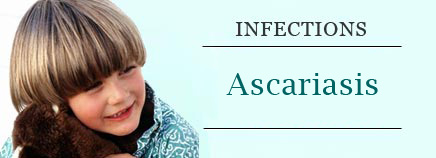
Ascariasis is an intestinal infection caused by a parasitic roundworm. While globally it is the most common human infection caused by worms, ascariasis is rare in the United States. Most cases happen in areas with poor sanitation or crowded living conditions.
Signs and Symptoms
Kids are more likely than adults to develop gastrointestinal symptoms with an ascariasis infection because their smaller intestines are at greater risk for intestinal blockage. The greater the number of worms involved, the more severe the symptoms are likely to be.
Symptoms seen with mild infestation include:
- worms in stool (poop)
- coughing up worms
- loss of appetite
- fever
- wheezing
More severe infestations can cause more serious signs and symptoms, including:
- vomiting
- shortness of breath
- abdominal distention (swelling of the abdomen)
- severe stomach or abdominal pain
- intestinal blockage
- biliary tract blockage (includes the liver and gallbladder)
Description
Ascariasis occurs when worm eggs of the parasite Ascaris lumbricoides (commonly found in soil and human feces) are swallowed. This can happen from contaminated food, drink, or soil. The roundworms range in size from 5.9 to 9.8 inches for adult males and 9.8 to 13.8 inches for adult females. The worms can grow to be as thick as a pencil and can live for 1 to 2 years.
Ascariasis is often found in developing countries with poor sanitary conditions or in areas where human stool is used as fertilizer. After the eggs are swallowed, they pass into the intestines, where they hatch into larvae. The larvae then begin to move through the body.
Once they get through the intestinal wall, the larvae travel from the liver to the lungs through the bloodstream. During this stage, pulmonary symptoms such as coughing (even coughing up worms) may occur. In the lungs, the larvae climb up through the bronchial tubes to the throat, where they are swallowed. The larvae then return to the small intestine where they grow, mature, mate, and lay eggs. The worms reach maturity about 2 months after an egg is ingested.
Adult worms live and remain in the small intestine. A female worm can produce up to 240,000 eggs in a day, which are then discharged into the feces and incubate in the soil for weeks. Children are particularly susceptible to ascariasis because they tend to put things in their mouths, including dirt, and they often have poorer hygiene habits than adults.
Ascariasis is common in warmer or tropical climates, particularly in developing nations, where it can affect large segments of the population. Ascariasis is rare in the United States, due to strict sanitation rules and regulations.
Contagiousness
Ascariasis is not spread directly from one person to another. To become infected, an individual has to consume the worm’s eggs.
Prevention
The most important measure of protection against ascariasis is the safe and sanitary disposal of human waste. People living in areas of the world that use human feces as fertilizer must thoroughly cook all foods or clean them with a proper iodine solution (particularly fruits and vegetables).
Children who are adopted from developing nations are often screened for worms as a precautionary measure. Kids who live in underdeveloped areas of the world may be prescribed a preventive deworming medication.
These practices are recommended for all children:
- Try as much as possible to keep kids from putting things in their mouths.
- Teach kids to wash their hands well and often, especially after using the bathroom and before eating.
Professional Treatment
Doctors usually prescribe antiparasitic medication to be taken orally to kill intestinal roundworms. Sometimes the stool will be re-examined about 3 weeks after treatment to check for eggs and worms. Symptoms usually disappear within 1 week of starting treatment.
Very rarely, surgical removal of the worms may be necessary (particularly in cases of intestinal or liver-related obstruction, or abdominal infection). A child who has ascariasis should be checked for other intestinal parasites, such as pinworm.
Home Treatment
If your child has ascariasis, the medicine prescribed should be given as directed. To prevent reinfection:
- Make sure that your child washes his or her hands often, especially after using the bathroom and before eating.
- Have your pets checked for worms regularly.
- Keep your child’s fingernails short and clean.
- Sterilize any contaminated clothing, pajamas, and bedding.
- Try to find the source of the infection. Additional sanitation measures in or around your home may be necessary.
When to Call the Doctor
If your child has any of the symptoms of ascariasis, contact your doctor right away. Stool samples will be sent to a laboratory to check for eggs and worms to confirm the diagnosis.
Call the doctor if symptoms do not improve with treatment or if new symptoms start.

